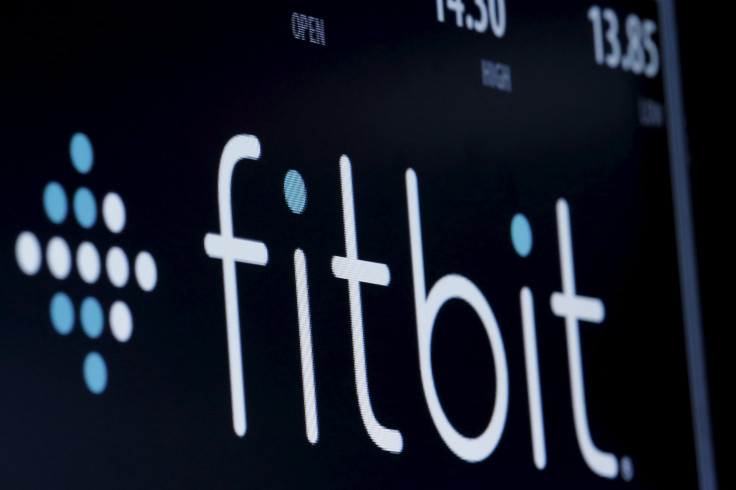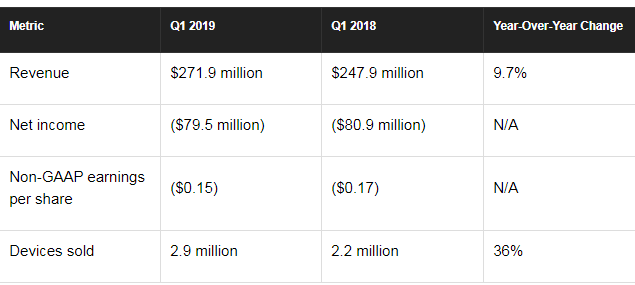Fitbit Boosts Tracker Sales With Cheap Devices

Fitness tracker and smartwatch company Fitbit (NYSE:FIT) reported its first-quarter results after the market closed on May 1. The struggling tracker business returned to growth, helping boost total revenue by nearly 10%. But gross margin plummeted thanks to higher sales of smartwatches, offsetting cost cuts and leading to a substantial loss.
Fitbit results: The raw numbers

What happened with Fitbit this quarter?
- Fitbit increased its device shipments at the expense of average selling price, which was down 19% year over year to $91 per device. The company introduced inexpensive devices in recent months, including the Versa Lite smartwatch and the Inspire fitness tracker.
- New devices introduced over the past 12 months, which include the Charge 3, Inspire, Inspire HR, and Versa Lite, accounted for 67% of total revenue.
- U.S. revenue was $135 million, down 3% year over year. Europe, the Middle East, and Africa generated $87 million of revenue, up 35% year over year, while the Asia-Pacific region grew revenue by 24% to $34 million. Revenue from the Americas excluding the U.S. slumped 5% to $15 million.
- Non-GAAP gross margin was 34.2%, down from 47.1% in the prior-year period. The company blamed a mix shift toward smartwatches and lower yields from recent product launches.
- GAAP operating expenses declined by 12.6% year over year to $172.3 million.
- Smartwatch devices sold rose 117% year over year, while tracker devices sold rose 17% year over year. Tracker sales had been declining for multiple years.
- Fitbit Health Solutions grew by 70% year over year to $30.5 million, and the company expects to reach its full-year target of $100 million of revenue.
What management had to say
Fitbit CEO James Park talked about the company's balanced approach during the earnings call: "Fitbit is committed to returning to growth and profitability, but we want to balance investment to drive future revenue growth with near-term cost savings. We continue to focus on driving operating leverage into the business with an effort to improve both our top line and reduced costs."
Park also talked up the success of the Inspire tracker: "Trackers have always been key to our portfolio and we continue to see a clear segment of users who prefer this form factor. In fact, Inspire HR is currently the best selling device in the U.S. and the retail channel ahead of Samsung, Fossil and Garmin."
Looking forward
Fitbit provided the following guidance for the second quarter:
- Devices sold is expected to increase, while average selling price is expected to decrease, on a year-over-year basis.
- Total revenue between $305 million and $320 million, up 2% to 7% year over year.
- Non-GAAP gross margin between 36% and 38%.
- Operating expenses are expected to decline year over year as Fitbit continues to reduce costs. However, expenses will rise compared to the first quarter due to spending to support recent product introductions.
- Non-GAAP net loss per share between $0.17 and $0.20 and adjusted EBITDA loss between $47 million and $59 million.
- For the full year, Fitbit expects:
- The same devices sold and average selling price dynamics as the second quarter.
- Total revenue between $1.52 billion and $1.58 billion, up 1% to 4% from 2018.
- Non-GAAP gross margin of roughly 40%, with a 41% gross margin in the second half.
- Operating expenses are expected between $660 million and $690 million.
- Adjusted EBITDA is expected between a loss of $30 million and breakeven.
- Free cash flow is expected to be a loss between $40 million and $70 million.
Fitbit managed to return its tracker business to growth in the first quarter, but that required launching cheaper devices that dragged down the average selling price. The smartwatch business continues to boom, but lower margins for those devices are hurting the bottom line.
Though Fitbit's turnaround is showing signs of progress, it doesn't look like the company will return to profitability anytime soon.
This article originally appeared in the Motley Fool.
Timothy Green has no position in any of the stocks mentioned. The Motley Fool owns shares of and recommends Fitbit. The Motley Fool has a disclosure policy.





















